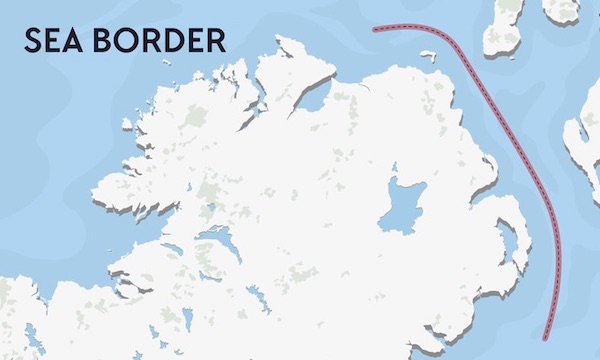
Increasing numbers of mainstream political and media figures have said they believe a united Ireland could come about within the next decade as a result of Brexit and other recent political developments.
As Westminster resumed following the general election, British Prime Minister Boris Johnson used his sizeable new majority to finally pass the Withdrawal Agreement negotiated with the EU in October.
The legislation introduces differing trade and regulatory regimes on either side of the Irish Sea. While the practical effect is not likely to be very significant, some believe it is a crack in the union that could widen.
Jonathan Powell, who was chief of staff for former British Prime Minister Tony Blair, has predicted a united Ireland within a decade. He said the introduction of an “Irish Sea border” will bring a renewed focus on Irish unity.
As a senior member of Blair’s Labour administration, Powell took a lead role in the negotiations that lead to the signing of the Good Friday Agreement in 1998. He predicted that Britain’s exit from the European Union could end the union between the north of Ireland and Britain within years.
“Once you put a border between Northern Ireland and the rest of the United Kingdom, Northern Ireland’s going to be part of a united Ireland for economic purposes,” he said.
“That will increase the tendency toward a united Ireland for political reasons, too. I think there is a good chance there will be a united Ireland within 10 years.”
Speaking on BBC Talkback, journalist Hugh Jordan said some DUP politicians had admitted they are already preparing for a united Ireland. He accused the DUP of “being disingenuous with their voters” and described some of them as “regular visitors to Dublin”.
Jordan revealed that a senior member of the DUP, attending a government function in Dublin, had given the union “between 10 and 15 years”.
The comments came after former Ulster Unionist Party leader Mike Nesbitt described Brexit as unionism’s biggest “own goal” which would lead to the break-up of the union.
Within hours of last week’s election results, which confirmed demographic trends pointing to a declining unionist population, there were calls for the Dublin government to advance preparations for a United Ireland.
Sinn Fein leader Mary Lou McDonald described the election results as a “defining moment in our politics” and that it was “impossible” to ignore demands for a border poll, a referendum on Irish reunification. Aontú leader Peadar Tóibín has said his party is considering an application to the High Court in Belfast for a Judicial Review into the refusal of the British government to hold a poll as set out by the Good Friday Agreement.
Fianna Fáil Senator Mark Daly, who compiled a parliamentary report on Irish unity, said the Brexit chaos showed that a referendum “requires long-term planning, engagement and critically preparation”.
Another senior Fianna Fáil figure, Stephen Donnelly, called for a detailed plan for a united Ireland. He pointed to BBC election coverage which described all of the Irish candidates in the recent Westminster election as “Other”, and in an unusually frank comment admitted that England “couldn’t give a fiddlers” about the north of Ireland.
The Wicklow TD noted that the Scottish government has published plans for what an independent Scotland would look like, and said Dublin should do the same. However, his own party have yet to come up with a white paper policy on a united Ireland.
“Detailed planning to look at further integration should be considered. Particularly in the context of Brexit and the obvious advantages to the people of Northern Ireland of closer integration with Ireland and the EU,” he said.
“There is a highly detailed plan for Scottish independence. A similar exercise for Northern Ireland to Ireland and EU linkages makes sense.”
Once ardent supporters of Brexit, hardline unionists have turned to damage limitation. The DUP’s Jeffrey Donaldson, who has replaced the defeated Nigel Dodds as DUP’s Westminster leader, said his party is now seeking to “mitigation” of the effects of Brexit and the Withdrawal Agreement.
Donaldson said he wanted new customs arrangements for the north of Ireland to be subject to an Assembly vote, and that there are “issues around how that would be exercised”, understood to mean whether it will be subject to the unionist veto.
Sammy Wilson, the new DUP Chief Whip at Westminster, told Boris Johnson he could ‘win back the trust’ of unionists by building a ‘Boris Bridge’ from the north of Ireland to Scotland.
Speaking in the House of Commons, the DUP MP pointed to a manifesto pledge to build a bridge as one way of retaining a “physical and economic link” to Britain. Even if the project is feasible and approved, it is thought the design and construction of such a bridge could take at least ten years.
His comments drew a positive but non-committal response from the British Prime Minister, who told MPs to “watch this space”.
![[Irish Republican News]](https://republican-news.org/graphics/title_gifs/rn.gif)
![[Irish Republican News]](https://republican-news.org/graphics/title_gifs/harp.gif)

